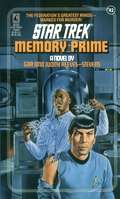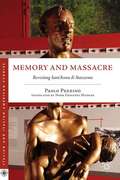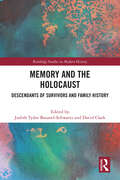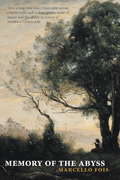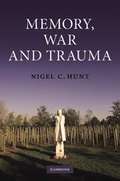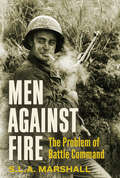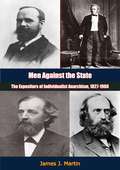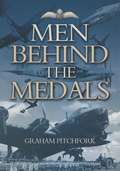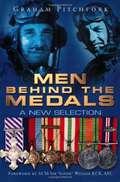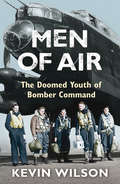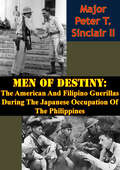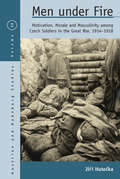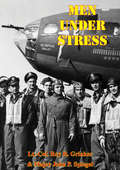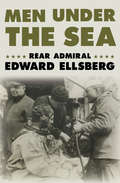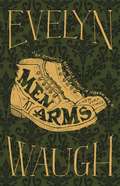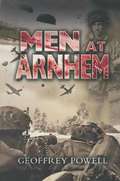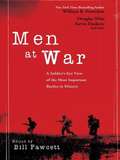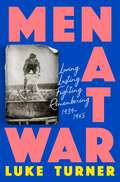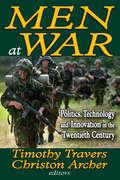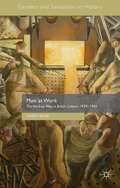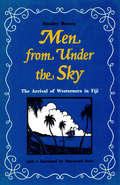- Table View
- List View
Memories of the Second World War in Neutral Europe, 1945–2023 (Routledge Studies in Second World War History)
by Manuel Bragança Peter TameThis edited volume is a sequel to, and a development of, The Long Aftermath: Cultural Legacies of Europe at War, 1936-2016 (2016). It focuses on the six major European countries and states that remained officially neutral throughout the Second World War, namely Ireland, Portugal, Spain, Sweden, Switzerland, and the Vatican. Its transnational, comparative and interdisciplinary approach addresses complex questions pertaining to collective remembrance, national policies and politics, and intellectual as well as cultural responses to neutrality during and after the conflict. The contributions are from a broad range of scholars working across the disciplines of history, literature, film, media, and cultural studies. Their thought-provoking chapters challenge many assumptions about neutrality in the post-war European and global context, thereby filling a gap in the existing scholarship. Common themes that run through the volume include the intertwined and dynamic links between neutrality and moral responsibility during and after the Second World War, the importance of memory politics and popular culture in shaping collective memories, and the impact of the Holocaust in shifting traditional perspectives on neutrality since the 1990s. This volume will be of interest to undergraduates, postgraduates, scholars interested in the field of memory studies, as well as non-specialist readers.
Memory Prime (Star Trek: The Original Series #42)
by Judith Reeves-StevensMemory Prime It is the central core of an immense computer library -- an elite network of research planetoids. Here, the Pathfinders -- the only artificial intelligences legally permitted to serve the Federation -- control and sift the overwhelming dataflow from thousands of research vessels across the galaxy... Now the greatest scientists in the Federation have gathered here for the prestigious Nobel and Z-Magnees prize ceremonies -- unaware that a deadly assassin is stalking one of them. And as Captain Kirk struggles to save his ship from sabotage and his first officer from accusations of murder, he discovers the hidden assassin is far from the deadliest secret lurking on Memory Prime...
Memory and Massacre
by Paolo PezzinoThis book recounts the massacre at Sant'Anna di Stazzema and examines its after effects. During the Nazi occupation of Italy, SS officers were charged with destroying anti-Fascist and anti-Nazi partisans. Paolo Pezzino not only reconstructs the events, but deals with the "forgetting" of the massacre.
Memory and the Holocaust: Descendants of Survivors and Family History (Routledge Studies in Modern History)
by David Clark Tydor Baumel-Schwartz, JudithThe importance of recording testimony of Holocaust survivors is well understood. While empowering the survivor and adding another layer of documentation about the cataclysm, it also serves as a bulwark against Holocaust denial. The same holds true for helping survivors pen their memoirs, or when writing their history. At the same time, this process also impacts upon the person recording the testimony, assisting the survivor in writing his or her memoirs, and certainly upon those who write about the survivors.What happens when the interviewer, biographer, translator, or memoir transcriber is a child or grandchild of that survivor? This book is based on the premise that a collection of personal narratives of descendants of Holocaust survivors who interviewed their parents\grandparents, wrote their history, or helped them with their memoirs, narratives in which they describe and analyze the impact of these activities on their personal trajectories, can greatly contribute to our understand of the Holocaust and, particularly, its aftermath. Each of the book's 14 chapters is a personal narrative by a child or grandchild of Holocaust survivors who analyzes the impact that their interviewing, writing about, or writing with their surviving parents\ grandparents had upon their lives.
Memory of the Abyss
by Marcello FoisWhen Samuele Stocchino is two years old the village sage can already see a heart shaped like a wolf's head beating in his breast: the heart of a murderer. As a colonial soldier in Northern Africa, recruited from one subject land to subdue another, the sixteen-year-old Stocchino learns to kill before he has learned to love, and it is a skill he hones to perfection on the pitiless battlefields of the Corso Front in the Great War. Returning to Sardinia a hero to a pauper's welcome, he finds his family swindled and his sweetheart stolen away by the richest clan in the region, and from one first crime of passion a bitter feud is born. Stocchino terrorizes his wealthy neighbours and anyone who dares to till their land until, with Italy now firmly under Mussolini's boot, his elimination becomes Il Duce's priority. As he continues to elude capture, the seeds of myth are sown and the legend of Samuele Stocchino is forged. Shrouded by mystery and portent, Memory of the Abyss is a stirring fusion of myth, history and fiction, a daring re-imagining of the true story of a notorious Sardinian bandit and a deft excavation of the island's cultural roots by one of Italy's most gifted and celebrated writers.
Memory, War and Trauma
by Nigel C. Hunt<p>Many millions of people are affected by the trauma of war. Psychologists have a good understanding of how experiences of war impact on memory but the significance of external environmental influences is often disregarded. Memory, War and Trauma focuses on our understanding of the psychosocial impact of war in its broadest sense. Nigel C. Hunt argues that, in order to understand war trauma, it is critical to develop an understanding not only of the individual perspective but also of how societal and cultural factors impact on the outcome of an individual's experience. <p>This is a compelling book which helps demonstrate why some people suffer from post-traumatic stress when other people don't, and how narrative understanding is important to the healing process. Its multi-disciplinary perspective will enable a deeper understanding of both individual traumatic stress and the structures of memory. </p>
Men Against Fire: The Problem of Battle Command
by S.L.A. "Slam" MarshallMen Against Fire, first published in 1947 (and updated in 1961), is an in-depth analysis of military leadership and infantry tactics, with numerous recommendations to improve the effectiveness of ground troops in combat situations. The psychology of combat (e.g., chapters “Why Men Fight” and “Men Under Fire”) is also examined by Marshall, himself a veteran of World War I and a combat historian during World War II.S.L.A. "Slam" Marshall was a veteran of World War I and a combat historian during World War II. He startled the military and civilian world in 1947 by announcing that, in an average infantry company, no more than one in four soldiers actually fired their weapons while in contact with the enemy. His contention was based on interviews he conducted immediately after combat in both the European and Pacific theaters of World War II.
Men Against Fire: The Problem of Battle Command in Future War
by S. L. A. MarshallThis book examines why only one in four men in battle seem to fire their guns, and offers means by which the number of active soldiers can be increased.
Men Against State: The Expositors of Individualist Anarchism, 1827-1908
by James J. Martin“...the starting point for anyone concerned with the antecedents of libertarianism in the United States...”MEN AGAINST THE STATE first appeared in the spring of 1953. Within a matter of months it had received nearly fifty highly commendatory reviews in thirteen countries in seven languages. Few products of American scholarly research in our time have gained more widespread international respect in such a short time.This book brought back into view a tradition which almost disappeared between the beginning of the First World War and the end of the Second, the philosophy and deeds of anti-statist libertarian voluntarism in the United States during the three generations which flourished between 1825 and 1910, in a style which a London commentator described as “a model of readable scholarship.”In the 1950s, the era of the “organization man” and almost unparalleled political passivity, MEN AGAINST THE STATE may have been a premature book, as some have observed, despite being reprinted two more times later in the decade. This quiet and unsensational circulation continued to further its reputation, nevertheless.In the last ten years however it has been recognized by many as the starting point for anyone concerned with the antecedents of libertarianism in the United States. The spread of interest in such thinking among a new generation has prompted the reissuance of this book, in a conventionally-printed popularly priced edition for the first time.
Men Behind the Medals: A New Selection
by Air Commodore Graham PitchforkThis book pays tribute to the quite remarkable bravery of those young men who risked, and all too often lost, their lives for their country during the war. The author, himself a distinguished Royal Air Force officer, has singled out twenty-one men to represent 'the many' to whom he dedicated the book; but he has chosen them with care to illustrate, as far as possible, the wide scope of the duties of the Royal Air Force in wartime.
Men Behind the Medals: A New Selection
by Graham PitchforkOf the many characteristics that emerge in warfare, none generates more admiration than gallantry. Using medal groups chosen for their unique combinations of gallantry and campaign awards, Graham Pitchfork pays tribute to the bravery of twenty Allied airmen who flew combat operations during the Second World War. Encompassing a wide cross-section of operational roles, theatres, aircraft types and aircrew categories, the men behind the medals' experiences and actions are narrated in relation to the wider war. These crucial operations are seen through a variety of different actions, including a night-fighter crew and a navigator who took part in supply drops to Resistance movements. The air war at sea is seen through the experiences of a Beaufighter pilot and a Royal Navy observer who attacked the Italian Fleet at Taranto. As the Second World War generation fade into history, their exploits need to live on forever as an example for future generations. In describing the exploits of the lesser-known heroes of that air war, Graham Pitchfork has ensured that 'The Many' will never be forgotten.
Men Of Air: The Doomed Youth Of Bomber Command
by Kevin WilsonThe story of the everyday heroism of British bomber crews in 1944 - the turning point year in Bomber Command's war against Germany.There were many ways for a combat crew to die during Bomber Command's war of 1944. Over German territory, bursts of heavy flak could tear the wings from their planes in a split second. Flaming bullets from German fighter planes could explode their fuel tanks, cut their oxygen supplies, destroy their engines. In the spring of that year, thousands of young men were shot, blown up, or thrown from their planes five miles above the earth; and even those who returned faced the subtler dangers of ice and fog as they tried to land their battered aircraft back home.The winter of 1944 was the most dangerous time to be a combat airman in RAF Bomber Command. The chances of surviving a tour were as low as one in five, and morale had finally hit rock bottom. In this comprehensive history of the air war that year, Kevin Wilson describes the most dangerous period of the Battle of Berlin, and the unparalleled losses over Magdeburg, Leipzig and Nuremberg. He tells how ordinary men coped with constant pressure of flying, the loss of their colleagues, and the threat of death or capture. And, by telling the story of the famous events of this period - the Great Escape, D-Day, the defeat of the V1 menace - he shows how, through sheer grit and determination, the 'Men of Air' finally turned the tide against the Germans.
Men Of Air: The Doomed Youth Of Bomber Command
by Kevin WilsonThe story of the everyday heroism of British bomber crews in 1944 - the turning point year in Bomber Command's war against Germany.There were many ways for a combat crew to die during Bomber Command's war of 1944. Over German territory, bursts of heavy flak could tear the wings from their planes in a split second. Flaming bullets from German fighter planes could explode their fuel tanks, cut their oxygen supplies, destroy their engines. In the spring of that year, thousands of young men were shot, blown up, or thrown from their planes five miles above the earth; and even those who returned faced the subtler dangers of ice and fog as they tried to land their battered aircraft back home.The winter of 1944 was the most dangerous time to be a combat airman in RAF Bomber Command. The chances of surviving a tour were as low as one in five, and morale had finally hit rock bottom. In this comprehensive history of the air war that year, Kevin Wilson describes the most dangerous period of the Battle of Berlin, and the unparalleled losses over Magdeburg, Leipzig and Nuremberg. He tells how ordinary men coped with constant pressure of flying, the loss of their colleagues, and the threat of death or capture. And, by telling the story of the famous events of this period - the Great Escape, D-Day, the defeat of the V1 menace - he shows how, through sheer grit and determination, the 'Men of Air' finally turned the tide against the Germans.
Men Of Destiny: The American And Filipino Guerillas During The Japanese Occupation Of The Philippines
by Major Peter T. Sinclair IIThe American and Filipino guerrillas that fought against the Japanese occupation of the Philippines were key in providing direction to resistance efforts and in the eventual liberation of the islands. The guerrillas escaped the aggressive counter-guerrilla efforts of the Imperial Japanese Army. The Japanese failure to deal with isolated soldiers and civilians provided the time they needed to organize into guerrilla groups and prepare for American forces liberation of the Philippines. This analysis of American and Filipino insurgents covers the effectiveness of Japanese counter guerrilla efforts, the intelligence structure created by General Douglas MacArthur's staff to support the guerrillas, the guerrilla's contributions to the liberation of the Philippines, and it examines how Americans would form guerrilla groups and fight as insurgents behind enemy lines if circumstances warranted. Additionally, it provides general insight as to how resistance movements form.
Men Under Fire: Motivation, Morale, and Masculinity among Czech Soldiers in the Great War, 1914–1918 (Austrian and Habsburg Studies #26)
by Jiří HutečkaIn historical writing on World War I, Czech-speaking soldiers serving in the Austro-Hungarian military are typically studied as Czechs, rarely as soldiers, and never as men. As a result, the question of these soldiers’ imperial loyalties has dominated the historical literature to the exclusion of any debate on their identities and experiences. Men under Fire provides a groundbreaking analysis of this oft-overlooked cohort, drawing on a wealth of soldiers’ private writings to explore experiences of exhaustion, sex, loyalty, authority, and combat itself. It combines methods from history, gender studies, and military science to reveal the extent to which the Great War challenged these men’s senses of masculinity, and to which the resulting dynamics influenced their attitudes and loyalties.
Men Under Stress
by Lt.-Col. Roy R. Grinker Major John P. SpiegelThe stress of war tries men as no other test that they have encountered in civilized life. Like a crucial experiment it exposes the underlying physiological and psychological mechanisms of the human being. Exceedingly valuable lessons can be learned from it regarding the methods by which men adapt themselves to all forms of stress, either in war or in peace. Under sufficient stress any individual may show failure of adaptation, evidenced by neurotic symptoms. Such symptoms then are pathological only in a comparative sense, when contrasted with the symptoms of those still making successful adaptations.While the material in this book concerns flying personnel almost exclusively, the psychological mechanisms under discussion in this book are those that apply to Everyman in his struggle to master his own environment. In this realm, a hair divides the normal from the neurotic, the adaptive from the non-adaptive. The failures of adaptation of the soldier described herein mirror Everyman’s everyday failures or neurotic compromises with reality.The book’s material is roughly divided into a discussion of war neuroses appearing overseas and those in combat veterans returned home for relief from flying or for rehabilitation. “Men under Stress” covers a vast array of topics, beginning with the background and selection of flight personnel, followed by seventeen chapters on the combat environment and reactions to it—which include the subjects of morale, combat stress, psychodynamics, emotional disorders and neurotic reactions, guilt and depression, aggression and hostility, psychosomatic states; psychotic-like states, and the treatment modalities of psychotherapy, narcosynthesis, and adjunctive treatment. The book closes with two chapters on civilian applications, including civilian psychiatry and general social implications.
Men Under the Sea
by Rear Admiral Edward Ellsberg&“Ellsberg&’s writings chronicled his experiences and attitudes on the topic of marine salvage in a manner which has no equal in naval literature.&” —War History Online Commander Edward Ellsberg rose to fame after leading the harrowing effort to raise the sunken submarine S-51 just off Long Island. That is where he begins Men Under the Sea, his tribute to and history of the men who risk everything to plunge into the blackness of the deep sea. Ellsberg holds an expert&’s knowledge of deep-sea salvage, and that knowledge has put him repeatedly on the front lines of some of the world&’s worst wrecks. After the S-51, Ellsberg goes on to the heartrending tale of the sinking of the submarine S-4, which sank after a collision with forty sailors aboard. Commander Ellsberg races to the scene through land, air, and sea to search for potential survivors trapped aboard the sunken sub. Ellsberg also regales readers with stories of some of the most famous underwater missions in history, such as men submerging deep to recover £5 million worth of gold from the wreck of the Laurentic, bringing vast treasures from the ocean bottom, and diving to rescue thirty-three survivors from the stricken submarine Squalus. Ellsberg&’s passion, experience, and natural narrative talent turn Men Under the Sea into an unforgettable voyage.
Men at Arms (Sword of Honour Trilogy #1)
by Evelyn WaughThe first volume of Evelyn Waugh's masterful trilogy about war, religion, and politics. The next two books are Officers and Gentlemen, and The End of the Battle.
Men at Arnhem
by Geoffrey PowellWhen Men at Arnhem was first published in 1976 the author modestly concealed his identity behind a pseudonym and changed the names of his comrades in arms. But the book was at once recognised as one of the finest evocations of an infantrymans war ever written and those in the know were quick to identify the author. His cover has long since been blown, in this edition Geoffrey Powell adds an introduction in which he identifies the men who fought with him in those eight terrible days at Arnhem in September, 1944. The book cannot be said to be a military history in the strictest sense, even the units involved being unidentified, but the events described are, as the author points out in his introduction, as nearly accurate as memory allowed after a lapse of over thirty years. It is unlikely every to be surpassed as the most vivid first-hand account of one of those epic disasters which we British, in our paradoxical way, seem to cherish above and beyond the most glorious victories.
Men at War
by Bill FawcettEpic battles?as seen through the eyes of the men who fought them. From Gettysburg to D-Day, history?s most momentous battles have been recounted to the world on a grand scale. This book, for the first time ever, looks at man?s most epic battles from the point of view of the soldiers on the front lines; providing new insight into the great wars of history. Stories told by the Roman Legionaire, the British Doughboy, and the American Doggie, delve into these battles and battlefronts: Roman Legion Third Crusade under Richard Lionheart Waterloo, French under Napoleon American Civil War: Gettysburg WWI: Americans at Ardennes WWII: Japanese Island Defense WWII: D-Day, Americans at Normandy Marines at Chosin.
Men at War: Loving, Lusting, Fighting, Remembering 1939-1945
by Luke TurnerAs a child, Luke Turner was obsessed with the Second World War. He spent hours watching Sunday war films, poring over stories of derring-do and relishing in birthday trips to air museums. Lying in bed beneath Airfix fighter planes suspended from his ceiling, he would think about the men that might sit in their cockpits, and whether he could ever be one of them. Now, as an adult who has come to terms with a masculine identity and sexuality that is often erased from dominant military narratives, he undertakes a refreshingly honest analysis of his fascination with the war. In Men at War, Turner looks beyond the increasingly retrogressive and jingoistic ideal of a Britain that never was to recognise men of war as creatures of love, fear, hope and desire. From writers, filmmakers, artists and ordinary men - including those in his own family - Turner assembles a broad cast of characters to bring the war to life. There are conscientious objectors, a bisexual Commando, a pacifist poet who flew for Bomber Command, a transgender RAF pilot, a soldier who suffered in Japanese POW camps and later in life became an LGBT+ activist, and those who simply did what they could just to survive and return home to a complicated peace. As the conflict moves beyond living memory and the last veterans leave us, we are in danger of missing the opportunity to gain a true understanding of this rich history. By exploring a wartime experience that embraces sex, lust and the body as much as tactics and weaponry, Turner argues that the only way we can really understand the Second World War is to get to grips with the complexity of the lives and identities of those who fought and endured it.
Men at War: Loving, Lusting, Fighting, Remembering 1939-1945
by Luke TurnerAs a child, Luke Turner was obsessed with the Second World War. He spent hours watching Sunday war films, poring over stories of derring-do and relishing in birthday trips to air museums. Lying in bed beneath Airfix fighter planes suspended from his ceiling, he would think about the men that might sit in their cockpits, and whether he could ever be one of them. Now, as an adult who has come to terms with a masculine identity and sexuality that is often erased from dominant military narratives, he undertakes a refreshingly honest analysis of his fascination with the war. In Men at War, Turner looks beyond the increasingly retrogressive and jingoistic ideal of a Britain that never was to recognise men of war as creatures of love, fear, hope and desire. From writers, filmmakers, artists and ordinary men - including those in his own family - Turner assembles a broad cast of characters to bring the war to life. There are conscientious objectors, a bisexual Commando, a pacifist poet who flew for Bomber Command, a transgender RAF pilot, a soldier who suffered in Japanese POW camps and later in life became an LGBT+ activist, and those who simply did what they could just to survive and return home to a complicated peace. As the conflict moves beyond living memory and the last veterans leave us, we are in danger of missing the opportunity to gain a true understanding of this rich history. By exploring a wartime experience that embraces sex, lust and the body as much as tactics and weaponry, Turner argues that the only way we can really understand the Second World War is to get to grips with the complexity of the lives and identities of those who fought and endured it.
Men at War: Politics, Technology, and Innovation in the Twentieth Century
by Christon ArcherThe growing number of books on military history and the lively interest in military history courses at colleges and universities show that the study of war is enjoying considerable popularity. The reasons for this are arguable, but of immediate interest is the kind of military history that is taught and written. Here the student of war comes across an interesting division of opinion as to how military history should be written. Military history, lying as it does on the frontier between history and military science, requires knowledge of both fields. This fact often presents a difficulty to the history teacher.Generally speaking, history is a discipline by virtue of its subject matter, not by virtue of a particular methodology such as is characteristic of the sciences and of some social sciences. The perspective of Men at War is a cross between a professional internalist approach and a civilian contextual view. This separation is not unique to military history, for the same dualism tends to occur in those areas of history, such as law and medicine, that can be written both by members of the profession concerned lawyers and doctors and by those outside the profession.The problem is that at one extreme the contextual view can take the emotional content out of war, while at the other extreme the internalist view can put too much in. Men at War seeks to locate a military history that combines the professional, internalist method and the civilian, contextual method by showing that these are two fundamental sources from which a war derives. Seen in this way, this volume breaks new ground in defining the sources of twentieth-century power.
Men at Work: The Working Man in British Culture, 1939-1945 (Genders and Sexualities in History)
by Linsey RobbMen at Work explores the cultural portrayal of four essential wartime occupations: agriculture, industry, firefighting and the mercantile marine. In analysing a broad spectrum of wartime media (most notably film, radio and visual culture) it establishes a clear hierarchy of masculine roles in British culture during the Second World War.
Men from Under the Sky
by Stanley Brown Raymond BurrThe cannibal kings of Fiji are gone, but their spirit lives on. Cannibalism in Fiji and the gruesome "earth ovens" are gone; the kai vavalagi, "the men from over the horizon," changed that, bringing their own brands of justice tempered by the musket, disease, and dissoluteness.There were giants in those days, Fijians and Westerners alike. This gripping and unique history of Fiji by Stanley Brown, a well-known Fiji "old-timer" and historian, is woven around the lives of eleven Western "giants," Europeans and Americans who had the greatest impact on each epoch. Not all these Westerners lived to tell the tale.This stirring narrative is replete with hair-raising accounts of battles and brutality. One incident of supreme savagery was reported by Lockerby, a famous trader, who reported that more than three hundred fifty old men, women and children were butchered after a battle: "As the canoes sallied back tot he mainland coast in the evening, the reddening sky silhouetted the bodies of children hanging from the mastheads." The earth-ovens were well-fueled that evening. But time and the tides of civilization tame the savage beast, and today Fiji is busy developing its economy, but the old accounts and stories still ring true.

